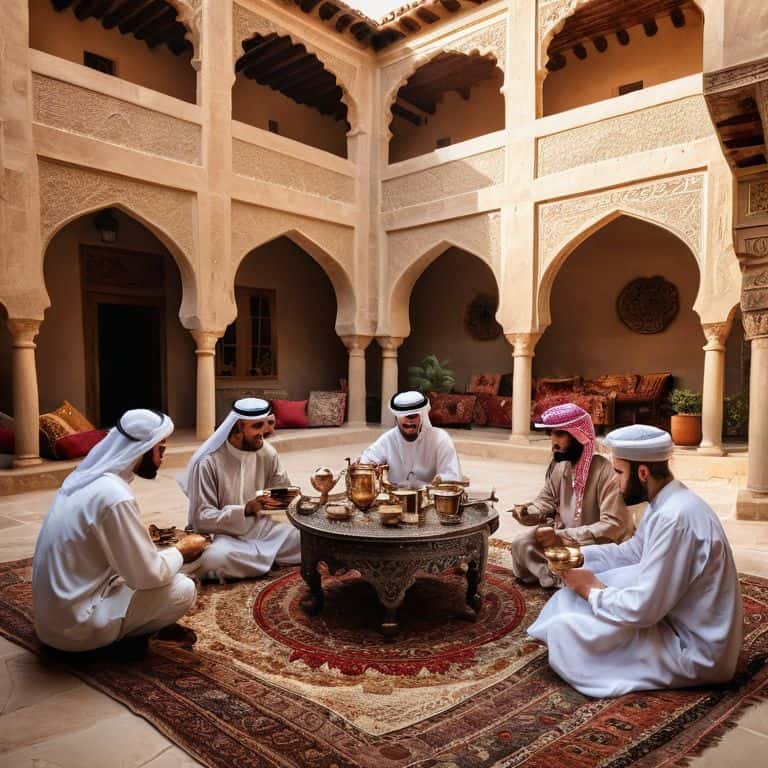As I sit in this quaint, historic cafe, surrounded by the aroma of freshly brewed coffee, I am reminded of the fascinating story of how coffee spread from yemen to the world. It’s a tale that has been told and retold, but often in a way that’s dry and lacking in depth. I’ve always been frustrated by the oversimplification of this rich history, which neglects the complex web of trade routes, cultural exchange, and human connection that fueled the spread of coffee. The truth is, the journey of coffee from Yemen to the rest of the world is a romantic and intricate one, full of twists and turns that have shaped the very fabric of our global community.
As a food historian, I’ve had the privilege of delving into the cultural significance of coffee, and I’m excited to share my findings with you. In this article, I promise to take you on a journey through the ancient trade routes and timeless tales that have brought Yemen’s coffee to your cup. I’ll share stories of the people, places, and traditions that have made coffee an integral part of our daily lives, and explore the ways in which it has fueled conversations, revolutions, and artistic movements throughout history. My goal is to provide you with a nuanced understanding of the complex history behind your daily cup of coffee, and to inspire a deeper appreciation for the rich cultural heritage that it represents.
Table of Contents
Brewing Revolutions Globally

As I sit in this quaint, centuries-old café, surrounded by the aroma of freshly brewed coffee, I am reminded of the coffee trade in the Middle Ages. It was a time when coffee slipped out of Yemen’s ports and into the hearts of people everywhere, fueling conversations, revolutions, and artistic movements. The stories of old, where merchants and traders would traverse the medieval coffee routes, exchanging not just goods but also ideas and cultures, are etched in my mind like the intricate designs on an antique coffee pot.
In the 17th century, Arabian coffee culture began to influence the Ottoman Empire, which in turn spread its own unique coffee traditions throughout Europe. I recall reading about the first coffee houses in 17th century Europe, where intellectuals and artists would gather to discuss the latest ideas and innovations. The atmosphere was electric, with the sound of clinking cups and lively debates filling the air. It was as if the coffee itself was brewing revolutions, sparking new thoughts and inspiring creativity.
As I reflect on Yemeni coffee traditions, I am struck by the rich flavors and aromas that have been passed down through generations. The traditional method of brewing coffee in Yemen, using a jabana, is an art form in itself, with the coffee beans being carefully roasted and ground to bring out the perfect balance of flavors. Whether in a bustling café or a quiet, historic coffee house, the experience of sipping coffee is always a sensory delight, transporting me to a world of warmth and hospitality.
Medieval Coffee Routes to Europe
As I sit in this quaint, historic cafe, surrounded by the whispers of the past, I am reminded of the ancient trade routes that once connected Yemen to the bustling ports of Europe. The aroma of freshly brewed coffee transports me to a time when merchants and travelers would carry exotic goods, including coffee, along the Middle Eastern and North African coastlines.
The journey of coffee to Europe was not just a matter of geographical expansion, but a cultural exchange that would shape the continent’s intellectual and artistic landscape. I imagine the excitement of those early European coffee drinkers, gathering in dimly lit coffeehouses to discuss the latest ideas and innovations, as they sipped on the mysterious, dark brew from Yemen.
Uncovering Yemeni Coffee Traditions
As I delve into the history of Yemeni coffee, I find myself enchanted by the rich cultural heritage that surrounds it. The traditional coffee ceremonies, the intricate patterns on the coffee pots, and the warm hospitality of the Yemeni people all contribute to a unique and captivating experience.
In Yemen, coffee is more than just a beverage – it’s a symbol of community bonding, bringing people together in a shared ritual that transcends social boundaries. The aroma of freshly brewed coffee wafts through the streets, inviting passersby to join in the conversation and savor the moment.
How Coffee Spread From Yemen

As I sit in this quaint, 17th-century European coffee house, I am reminded of the coffee trade in the Middle Ages, which played a significant role in shaping the course of coffee’s journey from Yemen to the world. The aroma of freshly brewed coffee transports me to the bustling ports of Yemen, where merchants would carefully load sacks of coffee onto ships bound for distant lands. It was here, in the heart of the Arabian Peninsula, that Arabian coffee culture first took root, giving rise to a rich tradition of coffee production and trade.
The influence of the Ottoman Empire on coffee’s spread cannot be overstated. As the empire expanded, coffee houses began to spring up in major cities, becoming hubs of intellectual and artistic activity. I recall visiting a historic coffee house in Istanbul, where I marveled at the intricate architecture and lively atmosphere, reminiscent of the coffee houses in 17th century Europe. These establishments not only served as gathering places for locals but also facilitated the exchange of ideas and cultures between East and West.
In my travels, I’ve had the privilege of experiencing Yemeni coffee traditions firsthand. From the meticulously prepared coffee ceremonies to the vibrant markets filled with exotic spices and spices, every aspect of Yemeni culture seems to be infused with the spirit of coffee. As I reflect on the medieval coffee routes that once connected Yemen to Europe, I am struck by the realization that coffee has always been more than just a beverage – it’s a symbol of community, creativity, and connection.
Arabian Coffee Culture Influence
As I sit in a quaint café, surrounded by the aroma of freshly brewed coffee, I am reminded of the profound influence of Arabian coffee culture on the world. The traditional coffee ceremonies, with their intricate rituals and elegant utensils, have been a cornerstone of social gatherings for centuries.
The rich flavors of Arabian coffee have also played a significant role in shaping the global coffee landscape, with its distinctive notes and aromas continuing to inspire coffee connoisseurs everywhere.
Ottoman Empires Coffee Legacy
As I sit in this quaint café, surrounded by the whispers of the past, I am reminded of the profound impact the Ottoman Empire had on the dissemination of coffee. Their traders and travelers carried the precious beans along the ancient Silk Road, leaving a trail of coffeehouses in their wake. These establishments became hubs of intellectual and artistic expression, fostering a sense of community and creativity that still resonates today.
In the heart of Istanbul, I discovered a charming coffee shop that embodied the rich heritage of Ottoman coffee culture. The aroma of finely ground coffee filled the air as I watched the barista expertly brew each cup, using techniques passed down through generations. It was as if time stood still, and I was transported to an era where coffee was not just a drink, but a catalyst for connection and conversation.
Unraveling the Ancient Trade Routes: 5 Key Insights into Coffee's Journey from Yemen to the World
- Follow the scent of cardamom and rosewater to uncover the aromatic trails that led coffee out of Yemen’s ports and into the hearts of traders and travelers along the medieval Silk Road
- Delve into the fascinating world of 15th-century Arabian coffee culture, where coffeehouses became hubs for intellectual and artistic expression, influencing the spread of coffee throughout the Middle East and beyond
- Explore the pivotal role of the Ottoman Empire in disseminating coffee culture, from the elegant coffeehouses of Istanbul to the imperial courts of Europe, where coffee became a symbol of luxury and refinement
- Discover how European explorers and colonizers played a complex role in coffee’s global expansion, introducing new production methods and trade routes that would forever alter the course of coffee’s history
- Wander through the historic cafes of Europe, where coffee fueled revolutionary ideas, artistic movements, and literary salons, to understand how coffee’s spread from Yemen became a catalyst for cultural and social change across the globe
Key Takeaways from the Ancient to Modern Coffee Trails
I’ve discovered that the humble coffee bean, which originated in Yemen, has been the catalyst for countless conversations, revolutions, and artistic movements throughout history, weaving a rich tapestry of cultural exchange and community building
The medieval trade routes that brought Yemeni coffee to Europe not only introduced a new beverage but also facilitated the transfer of ideas, fostering intellectual and artistic innovation in the coffeehouses of major cities like Vienna, Paris, and London
Through my research and travels, I’ve come to appreciate the profound influence of Arabian coffee culture on the Ottoman Empire and beyond, leaving an enduring legacy in the traditional coffee ceremonies, elegant coffee pots, and warm hospitality that continue to define the coffee experience in many parts of the world today
A Brewing Legacy
As I sit in a quaint café, surrounded by the whispers of the past, I am reminded that coffee’s journey from Yemen to the world was not just a voyage of beans, but a testament to the human spirit’s capacity to connect, to create, and to converse over a cup that transcends borders and time.
Isabella Marino
A Legacy in Every Cup

As I reflect on the journey of coffee from Yemen to the world, I am reminded of the rich cultural heritage that has been woven into the fabric of our daily lives. From the medieval trade routes that connected Yemen to Europe, to the influence of Arabian coffee culture on the Ottoman Empire, every step of the way has been marked by a deep passion for community, conversation, and creativity. Whether in the historic cafes of Vienna or the modern coffee shops of today, the spirit of coffee remains a powerful catalyst for connection and inspiration.
And so, as we sip our coffee and savor the flavors of distant lands, let us not forget the timeless tales that have brought us to this moment. For in the simple, yet profound, act of sharing a cup of coffee, we are participating in a global tradition that transcends borders and cultures, speaking to our deepest desires for connection, creativity, and community. May the legacy of Yemen’s coffee continue to inspire us, one cup at a time.
Frequently Asked Questions
What role did trade routes such as the Silk Road play in the spread of coffee from Yemen to other parts of the world?
The Silk Road was more than just a trade route – it was a conduit for cultures, ideas, and flavors. As caravans traversed this ancient network, coffee from Yemen was introduced to the Middle East, Europe, and Asia, leaving an indelible mark on the culinary landscape of each region it touched.
How did the cultural and social habits of the Arabian Peninsula influence the way coffee was consumed and appreciated in other regions?
As I sit in this quaint café, surrounded by the whispers of centuries past, I’m reminded of how Arabian traditions wove a rich tapestry of coffee culture, where the brew was savored in intimate gatherings, fostering a sense of community and intellectual curiosity that would forever alter the way we experience coffee.
What were some of the key events or figures that contributed to the introduction and popularization of coffee in Europe and beyond?
As I sit in this quaint Viennese café, I ponder the pioneers who brought coffee to our shores. Figures like Pietro Della Valle, who introduced coffee to Italy, and Soliman Aga, the Ottoman ambassador who sparked Paris’ coffee craze, come to mind. Their stories, like the rich aromas wafting through these historic halls, are a testament to coffee’s power to bridge cultures and ignite conversations.



